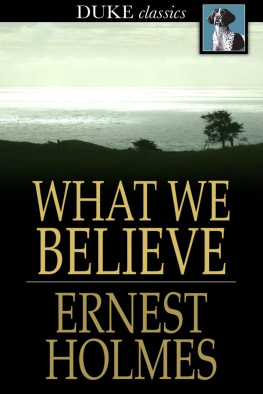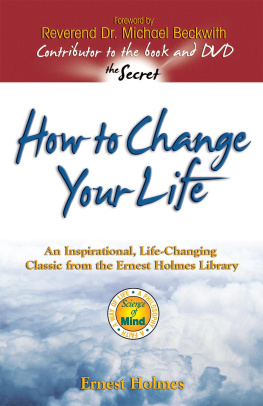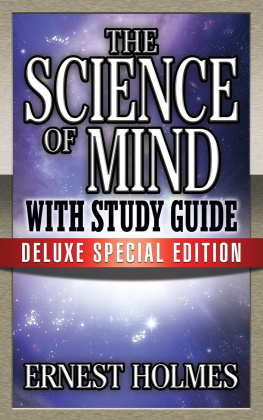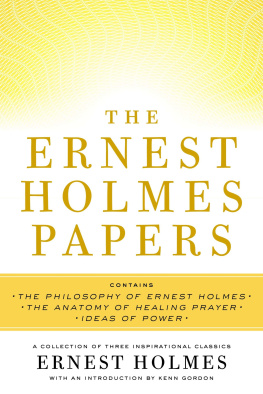WHAT WE BELIEVE
THE ESSENCE OF SCIENCE OF MIND
* * *
ERNEST HOLMES
*
What We Believe
The Essence of Science of Mind
From a 1927 edition
ISBN 978-1-62011-474-2
Duke Classics
2012 Duke Classics and its licensors. All rights reserved.
While every effort has been used to ensure the accuracy and reliability of the information contained in this edition, Duke Classics does not assume liability or responsibility for any errors or omissions in this book. Duke Classics does not accept responsibility for loss suffered as a result of reliance upon the accuracy or currency of information contained in this book.
Contents
*
Declaration of Principles
*
We Believe in God, the Living Spirit Almighty; one indestructible, absolute, and self-existentCause. This One manifests Itself in and through all creation but is not absorbed by Its creation. Themanifest universe is the body of God; it is the logical and necessary outcome of the infinite selfknowingness of God.
We Believe in the incarnation of the Spirit in everyone and that all people are incarnations of theOne Spirit.
We Believe in the eternality, the immortality, and the continuity of the individual soul, forever andever expanding.
We Believe that heaven is within us and that we experience it to the degree that we becomeconscious of IT.
We Believe the ultimate goal of life to be a complete emancipation from all discord of everynature, and that this goal is sure to be attained by all.
We Believe in the unity of all life, and that the highest God and the innermost God is one God.
We Believe that God is personal to all who feel this indwelling Presence.
We Believe in the direct revelation of Truth through the intuitive and spiritual nature of theindividual, and that any person may become a revealer of Truth who lives in close contact with theindwelling God.
We Believe that the Universal Spirit, which is God, operates through a Universal Mind, which isthe Law of God; and that we are surrounded by the Creative Mind which receives the directimpress of our thought and acts upon it.
We Believe in the healing of the sick through the Power of this Mind.
We Believe in the control of conditions through the Power of this Mind.
We Believe in the eternal Goodness, the eternal Loving-kindness, and the eternal Givingness ofLife to all.
We Believe in our own soul, our own spirit, and our own destiny; for we understand that the life ofall is God.
Essence of Science of Mind
*
Science of Mind in its broadest and truest sense includes the best in science, religion, andphilosophy. Science of Mind is not a personal opinion, nor is it a special revelation. It is the resultof the best thought of the ages. It borrows much of its light from others, but in so doing does notrob anyone, for truth is universal and never personal. We need the entire revelation of the wholeworld, and even with this we shall have little enough.
The universe is impersonal. It gives alike to all. It is no respecter of persons. It values each alike.The philosopher, the priest, the professor, the humanitarian, the empire builder, each has caughtsome gleam of the eternal glory.
Science of Mind does not scoff at the works of medical science, for instance. Science of Mind is acomplement to medical science and when so understood and practiced will help heal the world ofits physical infirmities.
The world of knowledge needs to be knit together and not pulled apart. We have no objection toany form of healing. What we insist on is that there can be no permanent healing of the bodywithout a correspondingly permanent poise in the mental and emotional life. Psychosomaticmedicine has shown that mental disturbances, conscious or subjective, produce physical reactionsin the body. If the body is to be permanently well, one's mental life must be creative, peaceful, andhappy. This is the purpose of mental healing, whether it be approached from the psychological orthe metaphysical angle.
Science of Mind teaches that there is a favorable physical reaction, an effect, which follows apattern of thought incorporating ideas of health, for the law of cause and effect governs everything.Similarly, it is held that right thinking will result in a greater experience of success and abundance.A successful person thinks success, and the law of mind that reacts has no other choice than toproduce an effect corresponding to the causative idea.
The road to freedom lies not through mysteries or occult performances, but through the intelligentuse of natural forces and laws. The law of mind is a natural law in the spiritual world. We need notask why this is so. There can be no reason given as to why the truth is true. We do not create lawsand principles but discover and make use of them.
God, the universal life-force and energy running through everything, is an intelligent presencepervading all space; a self-existent cause; a perfect unit, a complete wholeness.
The unthinking would believe that God keeps books and checks up on the wrongdoing of eachindividual member of the human race, and that some are sent to heaven and some to hell and all forthe glory of God. Each has believed in the kind of God who best fitted their personal ideas, or inthe idea of God that has been imposed upon them by ignorant or superstitious leaders.
But always there has been the voice of those crying in the wilderness of superstition, ignorance,doubt, and fear; the voice of those who have thought things through to conclusions that have beenindependent of race beliefs, of the subtleties of religious dogma, and of theological superstitions.These have been the way showers of humanity and millions have lighted candles from their flames.But the world progresses slowly; evolution and the growth of knowledge and wisdom is a processof time and experience.
In principle the great religions of the world do not differ as much as they appear to. Stripped oftheir accumulations of adornments and observances, and the encrustation's of interpretations, it isfound that each acknowledges that there is one central Power, Force, or God, which is self-existent;and it is from this one power that all things emanate. All of life flows from it and is a part of it.Nothing can exist separate from it. The Christian interpretation of the ultimate nature of thecreative Source of the universe places more emphasis on the life of the individual as being anintegral part of the one life.
But even in the Christian religion, much of its real meaning is hidden by words that are misleadingand symbols that but few understand. We could scarcely find a greater riddle to solve than themeaning of the "Holy Trinity." Also, most people either reject the Bible entirely or accept it totallyand literally. Both these methods are mistakes.
Religion is our idea of God, and the Bible is a written declaration of the belief in God held by agreat people-the Jews. It is, in many respects, the greatest book ever written and does truly point away to eternal values. But it is only one explanation and cannot be considered the only light onreligion; for there are many others, which, taken together, weave the story of truth into a completeand unified pattern.
The many sacred books of the East constitute other Bibles which point ways to the truth; but eachis only another way and cannot be considered to be the way. All peoples have had their religionsand have had their Bibles; all have pointed a way to ultimate values, but can we say that any ofthem has really pointed the way? It is unreasonable to suppose that any one group encompasses allthe truth and alone can reveal the way of life for all others.







